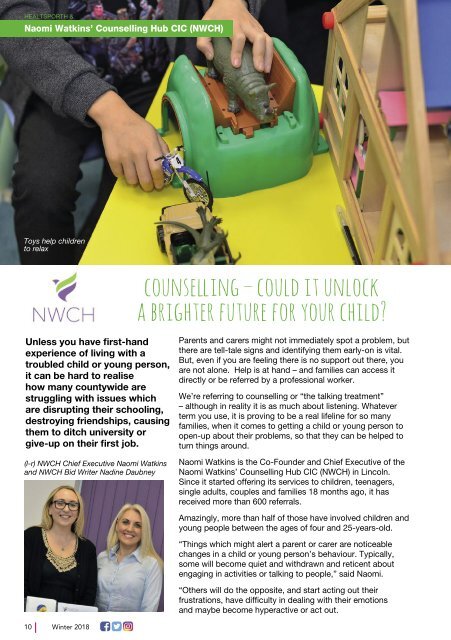molly_issue34_winter
Create successful ePaper yourself
Turn your PDF publications into a flip-book with our unique Google optimized e-Paper software.
HEALTSPORTH &<br />
Naomi Watkins’ Counselling Hub CIC (NWCH)<br />
Toys help children<br />
to relax<br />
counseing – could it unlock<br />
a brighter future for your child?<br />
Unless you have first-hand<br />
experience of living with a<br />
troubled child or young person,<br />
it can be hard to realise<br />
how many countywide are<br />
struggling with issues which<br />
are disrupting their schooling,<br />
destroying friendships, causing<br />
them to ditch university or<br />
give-up on their first job.<br />
(l-r) NWCH Chief Executive Naomi Watkins<br />
and NWCH Bid Writer Nadine Daubney<br />
Parents and carers might not immediately spot a problem, but<br />
there are tell-tale signs and identifying them early-on is vital.<br />
But, even if you are feeling there is no support out there, you<br />
are not alone. Help is at hand – and families can access it<br />
directly or be referred by a professional worker.<br />
We’re referring to counselling or “the talking treatment”<br />
– although in reality it is as much about listening. Whatever<br />
term you use, it is proving to be a real lifeline for so many<br />
families, when it comes to getting a child or young person to<br />
open-up about their problems, so that they can be helped to<br />
turn things around.<br />
Naomi Watkins is the Co-Founder and Chief Executive of the<br />
Naomi Watkins’ Counselling Hub CIC (NWCH) in Lincoln.<br />
Since it started offering its services to children, teenagers,<br />
single adults, couples and families 18 months ago, it has<br />
received more than 600 referrals.<br />
Amazingly, more than half of those have involved children and<br />
young people between the ages of four and 25-years-old.<br />
“Things which might alert a parent or carer are noticeable<br />
changes in a child or young person’s behaviour. Typically,<br />
some will become quiet and withdrawn and reticent about<br />
engaging in activities or talking to people,” said Naomi.<br />
“Others will do the opposite, and start acting out their<br />
frustrations, have difficulty in dealing with their emotions<br />
and maybe become hyperactive or act out.<br />
10<br />
Winter 2018

















